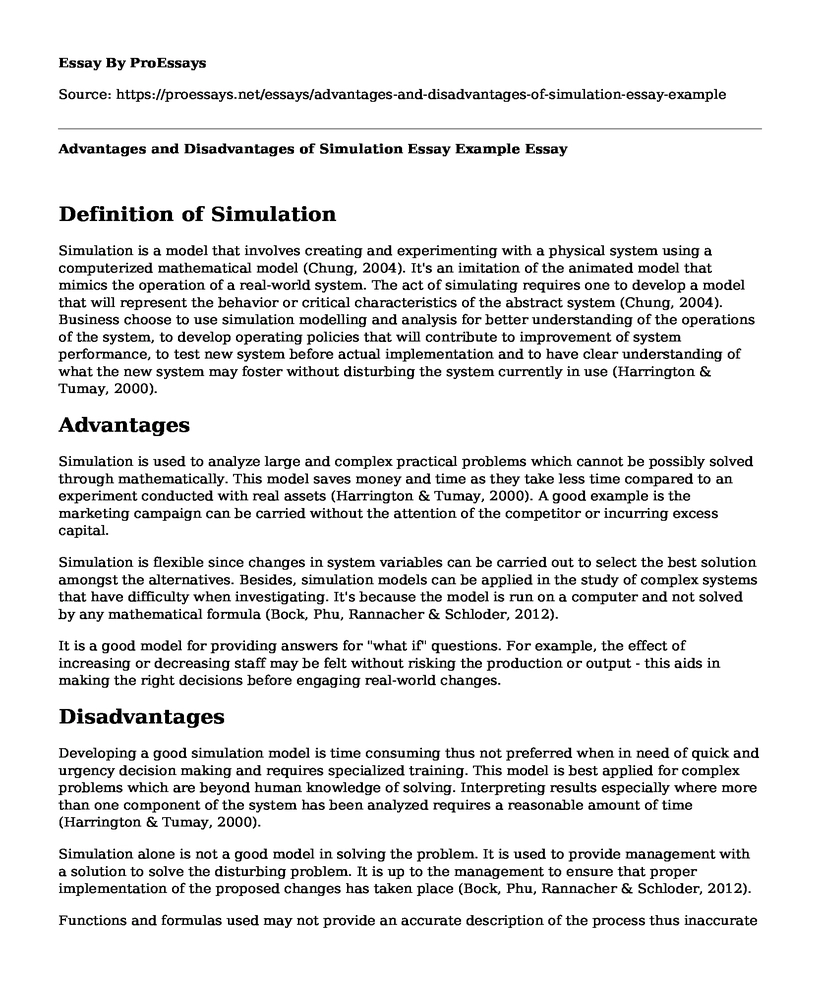Definition of Simulation
Simulation is a model that involves creating and experimenting with a physical system using a computerized mathematical model (Chung, 2004). It's an imitation of the animated model that mimics the operation of a real-world system. The act of simulating requires one to develop a model that will represent the behavior or critical characteristics of the abstract system (Chung, 2004). Business choose to use simulation modelling and analysis for better understanding of the operations of the system, to develop operating policies that will contribute to improvement of system performance, to test new system before actual implementation and to have clear understanding of what the new system may foster without disturbing the system currently in use (Harrington & Tumay, 2000).
Advantages
Simulation is used to analyze large and complex practical problems which cannot be possibly solved through mathematically. This model saves money and time as they take less time compared to an experiment conducted with real assets (Harrington & Tumay, 2000). A good example is the marketing campaign can be carried without the attention of the competitor or incurring excess capital.
Simulation is flexible since changes in system variables can be carried out to select the best solution amongst the alternatives. Besides, simulation models can be applied in the study of complex systems that have difficulty when investigating. It's because the model is run on a computer and not solved by any mathematical formula (Bock, Phu, Rannacher & Schloder, 2012).
It is a good model for providing answers for "what if" questions. For example, the effect of increasing or decreasing staff may be felt without risking the production or output - this aids in making the right decisions before engaging real-world changes.
Disadvantages
Developing a good simulation model is time consuming thus not preferred when in need of quick and urgency decision making and requires specialized training. This model is best applied for complex problems which are beyond human knowledge of solving. Interpreting results especially where more than one component of the system has been analyzed requires a reasonable amount of time (Harrington & Tumay, 2000).
Simulation alone is not a good model in solving the problem. It is used to provide management with a solution to solve the disturbing problem. It is up to the management to ensure that proper implementation of the proposed changes has taken place (Bock, Phu, Rannacher & Schloder, 2012).
Functions and formulas used may not provide an accurate description of the process thus inaccurate output. Simulation relies on input data; if the data is incorrectly keyed in; therefore, the outcome is also incorrect.
References
Bock, H., Phu, H., Rannacher, R., & Schloder, J. (2012). Modeling, simulation and optimization of complex processes-- HPSC 2012.
Chung, C. (2004). Simulation modeling handbook (pp. 1-20). Boca Raton: CRC Press.
Harrington, H., & Tumay, K. (2000). Simulation modeling methods. New York: McGraw Hill.
Cite this page
Advantages and Disadvantages of Simulation Essay Example. (2022, Dec 06). Retrieved from https://proessays.net/essays/advantages-and-disadvantages-of-simulation-essay-example
If you are the original author of this essay and no longer wish to have it published on the ProEssays website, please click below to request its removal:
- Assignment Example on Chemical Formulations
- Quantitative Research Critique Paper Example
- Paper Example on Effect of Ethanol on Beetroot Cell Membrane
- Analyzing Quantitative Research Methods
- Uber PESTLE Analysis Paper Example
- Online Listening Research Experiment: Essay Sample
- Free Paper Sample: Food Advertisement Analysis







